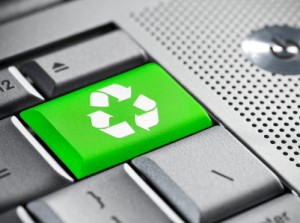
 According to statistics published by the EPA, computers and other consumer electronics account for roughly 2% of the “solid waste stream” in the US. Of this, less than 20% is properly recycled. The rest, unfortunately, ends up in landfills, where it becomes an environmental catastrophe. An old-school CRT monitor, for example, contains several pounds of lead (not to mention other harmful ingredients like other heavy metals, mercury, plastics, and toxic chemicals).
According to statistics published by the EPA, computers and other consumer electronics account for roughly 2% of the “solid waste stream” in the US. Of this, less than 20% is properly recycled. The rest, unfortunately, ends up in landfills, where it becomes an environmental catastrophe. An old-school CRT monitor, for example, contains several pounds of lead (not to mention other harmful ingredients like other heavy metals, mercury, plastics, and toxic chemicals).
As low-priced electronics continue to flood the market, the problem will only become worse. The solution is two-part: reducing the amount of waste, while ensuring those computers that do become waste are properly recycled.
Obsolescence in the computer hardware industry is largely driven by powerful allies in the software industry. For the average user’s everyday tasks (email, word processing, shopping, banking), computers have been powerful enough for many years. But, in order for the hardware industry to remain profitable, they need to give consumers a reason to upgrade their hardware every few years. The solution is provided by the software giants: new versions of popular applications and operating systems are released every few years, invariably with higher hardware requirements than their predecessors. To run the latest versions of Windows, Office, Photoshop, and other popular software, you need a newer computer with enough RAM, disk space, processor power, etc. If you don’t keep up, you’ll eventually lose the ability to exchange documents and information with your friends and colleagues who are using the latest formats. This is the number one reason why so many perfectly good computers end up in the trash each year.
Rather than throwing out that old computer, consider putting it to use. There are lots of fun projects you can do with a low-powered spare computer. The internet abounds with great suggestions. Old computers make great file servers, music jukeboxes, spares for the kids, digital recipe books for the kitchen, and so on. For example, I have a really old laptop (that I got for free) in my guest bedroom. My guests appreciate being able to check their email without interrupting my work on my computer. Rather than waste money buying the latest software for a free computer, I’ve loaded it up with free, open-source software: the Linux operating system, Firefox web browser, OpenOffice.org office suite, GIMP photo editor, etc. Experimenting with old computers is a great opportunity to expand your technical skills inexpensively.
Sooner or later, though, you’re going to be stuck with an old computer, monitor, printer, etc. that you simply don’t need. What’s the most responsible solution? The answer likely depends on where you live and just how old and useless the hardware is. Functional hardware can be sold or donated, while broken or useless hardware will need to be recycled.
If your business or school has a large quantity of computers, donating them to a charitable organization can be very satisfying. Many organizations list their computer needs right on their website, so pick your favorite charity and see if you can help them. Be aware, however, that there’s usually a minimum hardware specification for donations. It’s not that these organizations are ungrateful or haven’t heard the expression “beggars can’t be choosers;” it’s just a simple reality that computers that are underpowered for Windows, Word, etc. are basically more trouble than they’re worth, from an organizational perspective.
For the average home user with one or two old computers to dispose of, the easiest solution is often the classifieds (for example Craigslist or Freecycle). I recently offered up an ancient Mac for free, and it was snatched up almost instantly. It found a good home with a computer science grad student, who was building a collection of various hardware to practice her tech support skills. The ad was free to place, and I never had to leave the house. Even non-functional hardware is sometimes in demand for spare parts or hobbyist projects. The best part of giving a computer away is that its inevitable disposal becomes someone else’s problem!
Hopefully, using the tips above, you will prevent (or at least delay) more hardware from entering the waste stream. But, sooner or later, you’ll be stuck with a useless piece of hardware that you can’t even give away. Depending on where you live, there is almost certainly a recycling program of some type. The EPA maintains a directory of recycling programs by state. I am a big fan of local action, so I recommend calling your town dump or transfer station to find out their rules and regulations. In some cases, you might have to pay a small fee ($10 or so) to cover proper disposal, but it is money well-spent; the more these programs are utilized, the more widespread and efficient they will naturally become. Businesses also sometimes offer recyling services. Or, check with your hardware’s original manufacturer to see if they will take it back–it’s worth a try.
What happens to recycled electronics? Assuming the program is reputable, the hardware is stripped down to its components, which are then recycled into new products or properly disposed of. Much of this dangerous work takes place overseas; in other words, America’s toxic waste is shipped to less-regulated countries, raising many concerns for the environment and the health of the workers. For this reason, I really recommend a recycling program endorsed by the EPA (or similar organization), giving some measure of oversight. The best solution of all, of course, is to reuse or donate that old computer so that it doesn’t enter the waste stream in the first place!
Matthew Edward Liston is a writer, editor, musician, and green computing consultant located in the rural hill towns of New York.




[…] original here: The Green Computer: eCycling | Green Chi Cafe Posted in New Cafe | Tags: and-operating, few-years, hardware-, higher-hardware, […]
[…] Check out my new article on eCycling your old computer! […]
[…] Last week’s article on eCycling generated some interesting comments. One email I received made an excellent point: how could I discuss eCycling without mentioning privacy? A very good point, and so I’m using this week’s column to share my thoughts on the matter. […]
[…] previous Green Computer articles, I have extolled the virtues of reusing old computer hardware. This week, I want to give some […]
A very insightful post. Thanks for the info.
That’s an astonishing volume of computers that don’t get recycled properly. Moreover, I despise the idea of this equipment being shipped abroad, having seen first hand what actually happens to it.
Computer recycling is not a easy task. For that process you should get best electronic recycling center . So that you cna recycle your old computers to create a new things.
Comments are closed.